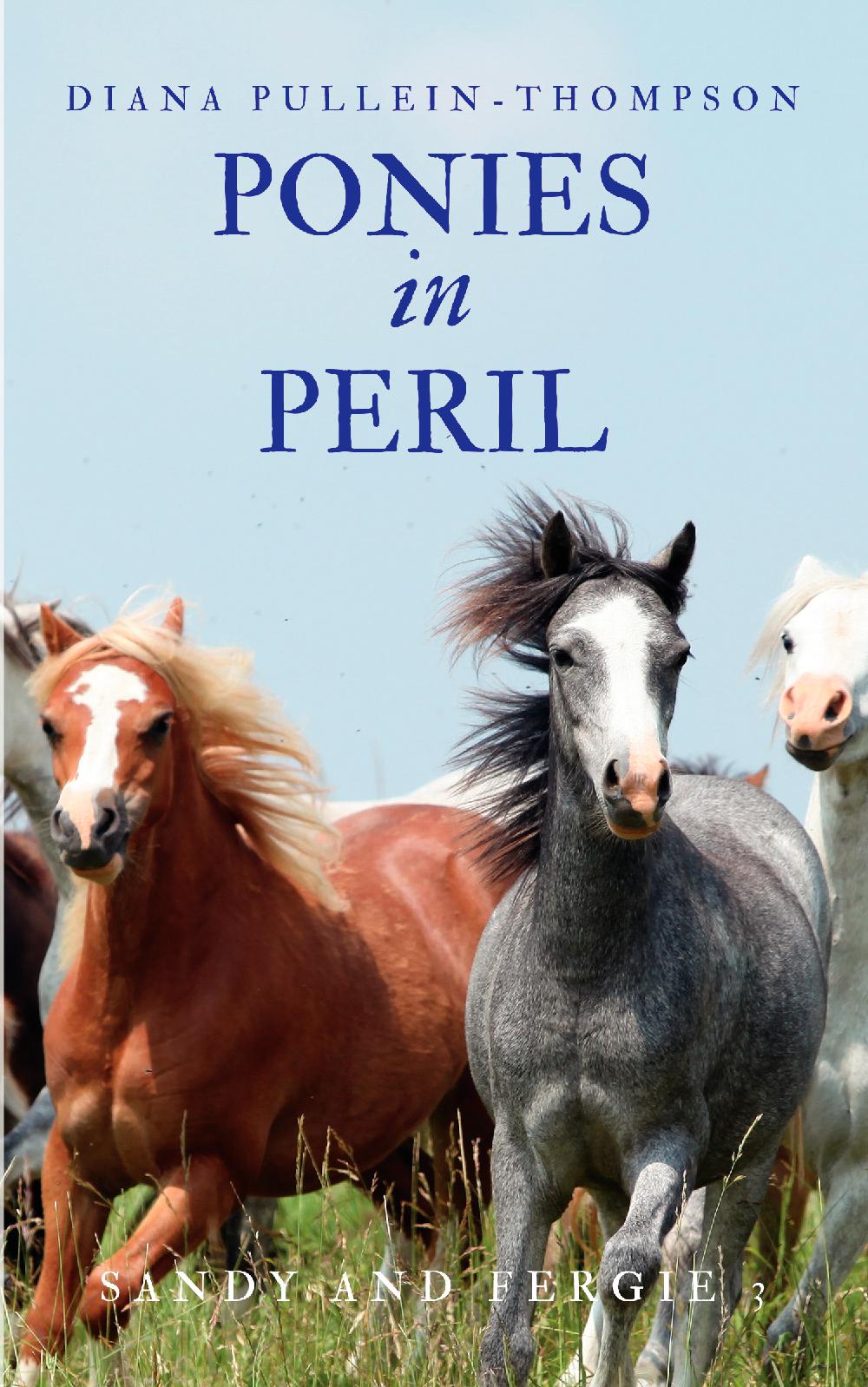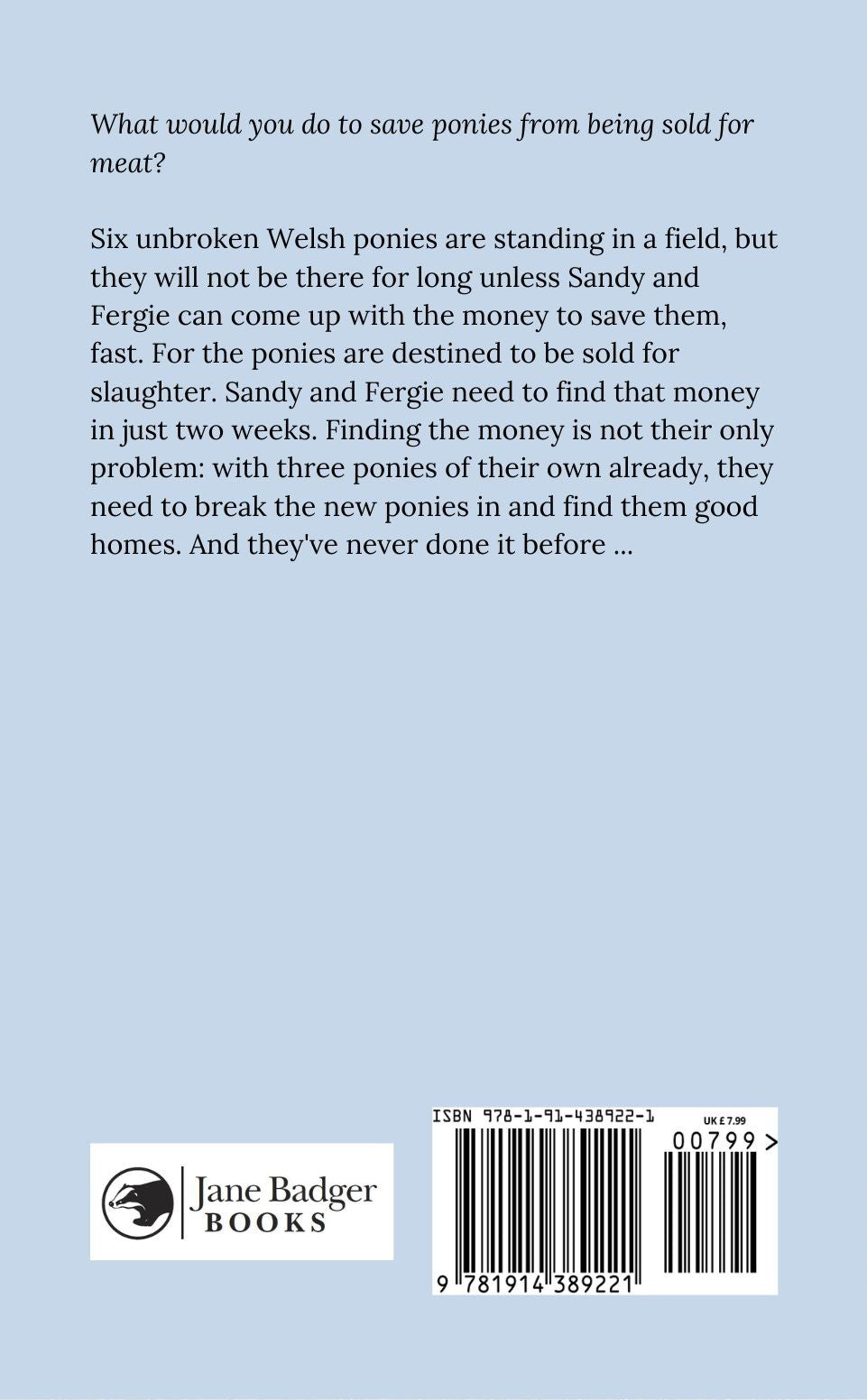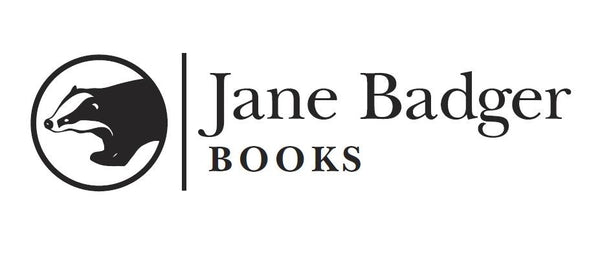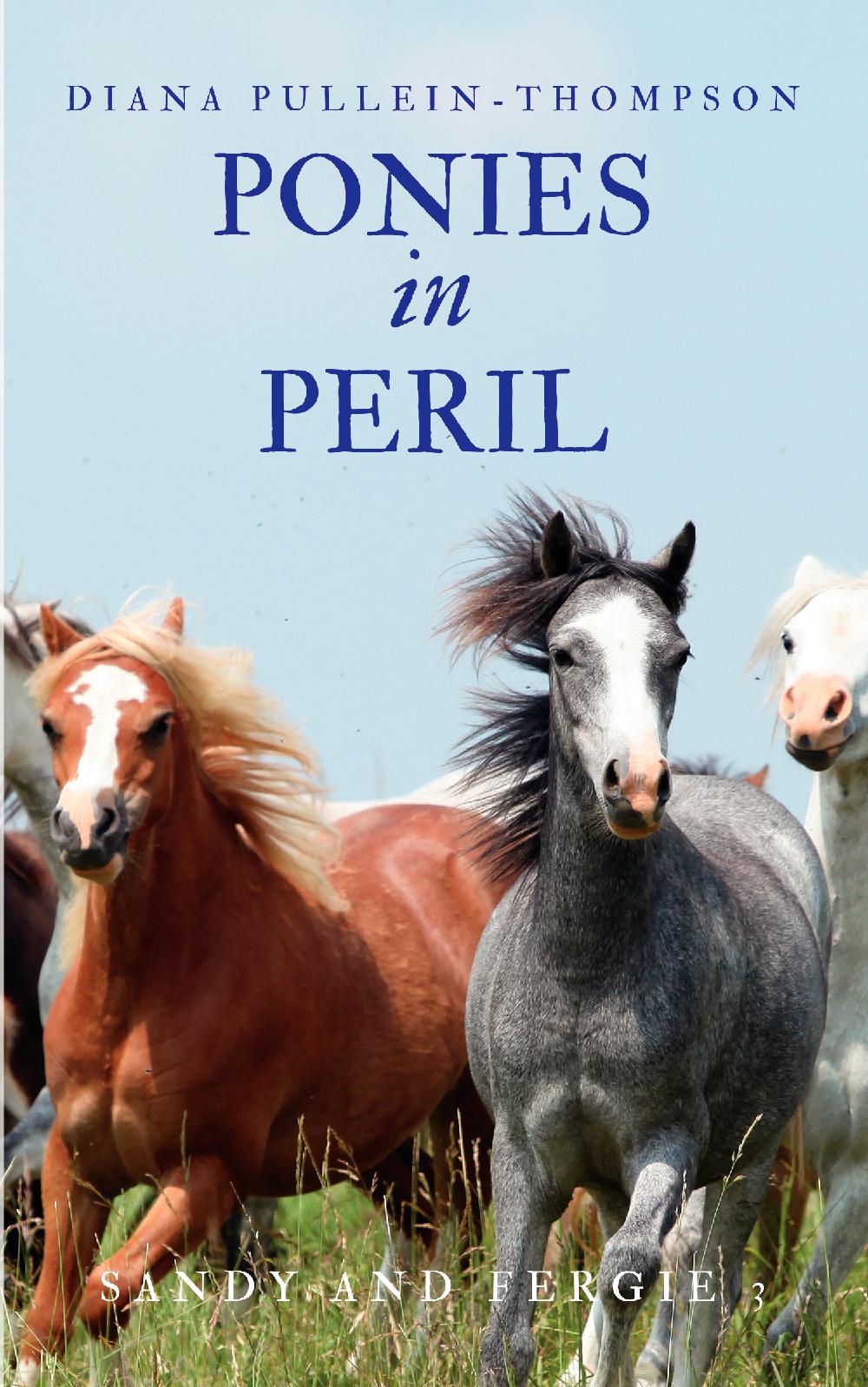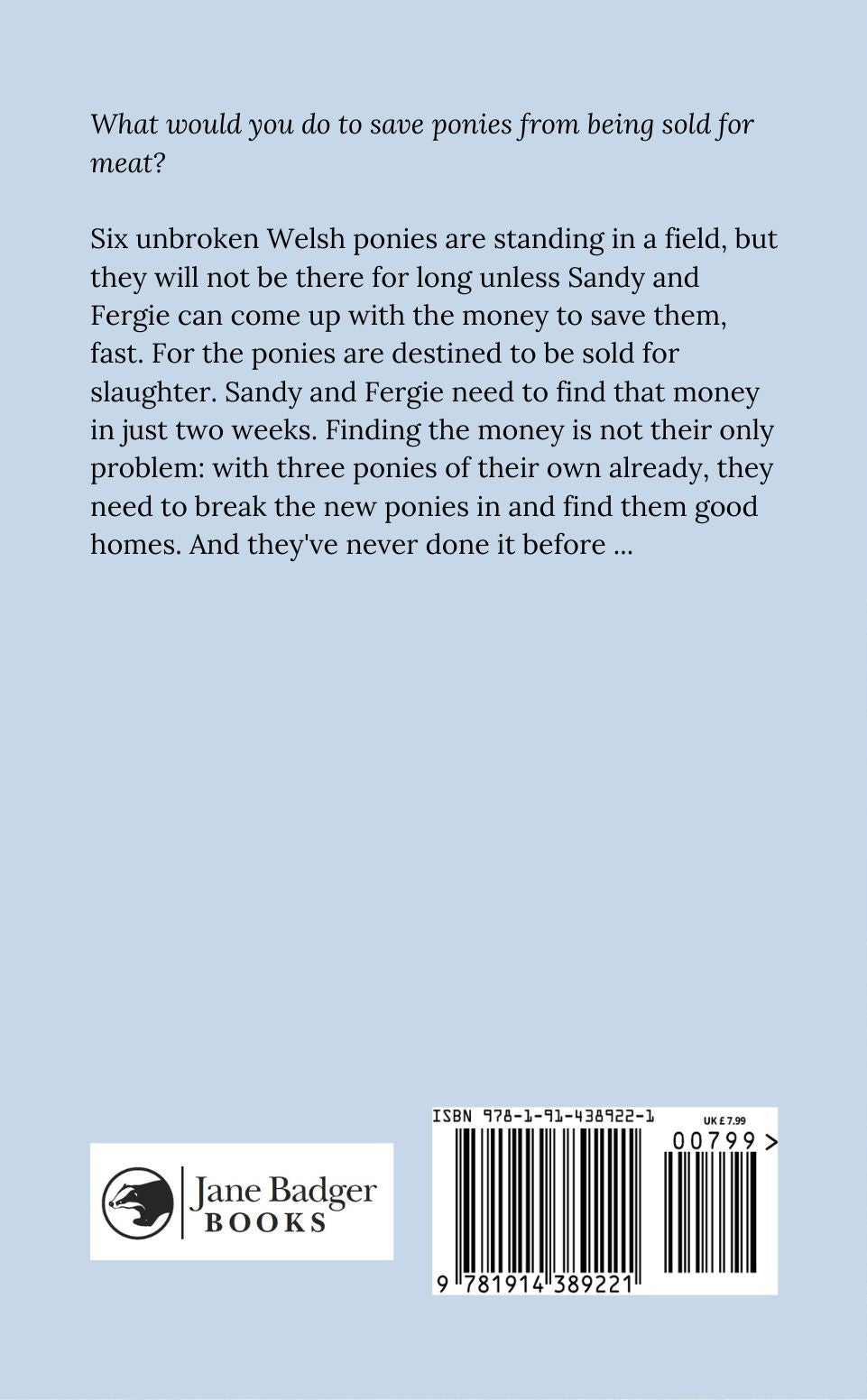Jane Badger Books
Diana Pullein-Thompson: Ponies in Peril (paperback)
Diana Pullein-Thompson: Ponies in Peril (paperback)
Illustrator: None
Couldn't load pickup availability
Share
What would you do to save ponies from being sold for meat? Six unbroken Welsh ponies are standing in a field, but they will not be there for long unless Sandy and Fergie can come up with the money to save them, fast. For the ponies are destined to be sold for slaughter. Sandy and Fergie need to find that money in just two weeks. Finding the money is not their only problem: with three ponies of their own already, they need to break the new ponies in and find them good homes. And they've never done it before ...
Sandy and Fergus series 3
Page length: 152
Original publication date: 1979
When will I get my book?
When will I get my book?
Paperbacks are printed specially for you and sent out from our printer. They are on a 72-hour turnaround from order to being sent out. Actual delivery dates will vary depending on the shipping method you choose.
Read a sample
Read a sample
“They’re as wild as hawks,” said Jake, sliding from his saddle. “See them? Beauties, though, aren’t they?”
We looked across the meadow to the trees where six four and five-year-old ponies stood swishing their long tails against the flies.
“And all going for meat,” added our friend, opening the gate. “It’s a crying shame.”
“But why?” I asked. “Couldn’t they be sold to good homes?”
“Money,” replied Jake grimly. “Love of money is at the root of all evil—that’s from the Holy Bible, isn’t it?”
“Yes, yes, I’m sure,” replied my brother, dismounting to lead Mimosa through the gate.
“Thought you were educated, Fergie,” teased Jake. “Thought you would give us chapter and verse.”
“Not from the Bible,” said my brother. “I’m not doing theology or R.I. for O’ Level. But tell us the story again. Dylan Jones has died. Right?”
“Right,” agreed Jake.
“And his heirs care nothing for the farm or the animals. They just want to settle the estate, sell up as soon as possible, and pocket the cash, after taxes have been paid.”
“Nicely put,” said Jake, lighting a cigarette.
“And it’s quickest to sell the ponies for meat—for France, I suppose,” said Fergie, a crease appearing above his dark brows which almost met above his fine straight nose.
“An offer has been made—six hundred pounds,” said Jake, starting to lead his bay, Bullfinch, across the field towards the trees. “It’s not a lot; maybe you could get double that if the ponies were broken and schooled, but who’s going to do that? Labour here’s expensive and it takes a good six weeks to break an ordinary pony, let alone a wild bunch like this lot. They haven’t been handled since they were foals.”
“What about us?” I asked in a rush.
“Us?” echoed Jake.
“Fergie and me?”
“Well, if you’ve got six hundred pounds to spare … .”
“We haven’t, that’s the short answer,” said my brother.
By now we could see the ponies clearly, as they turned to stare at us with their pointed ears pricked and their eyes shining. There were two greys, one bay, a skewbald, a dun and a dark brown. Their heights varied from around 11.3 up to 13.3 hands high.
“The larger ones have a streak of Arab, you can see it in their heads and the way they carry their tails,” said Jake. “If they were registered they would have fetched more, but old Dylan never bothered with that sort of thing—hated paperwork.”
“He bred them himself?” asked Fergie.
“Yes, he had a stallion running with his mares for years. Very haphazard it was. He liked things natural. None of this new-fangled stuff,” said Jake. “The mention of factory farming was enough to bring on a heart attack. But now, of course, he’s left his muddle for someone else to sort out.”
As we drew near, the ponies turned, and, with several loud snorts, set off across the meadow at full gallop, their tails streaming out behind them.
“Just think of all that beauty carved up and hanging in the butchers’ shops in France,” said Jake.
“Or put into tins as stewing steak,” added Fergie.
“We’ve got to save them,” I insisted. “Dad can loan us the money.”
“He’s got to buy a new engine for the mini-bus, remember?” said Fergie. “Six hundred pounds is quite a lot of money, more than half of one thousand pounds.”
“And they won’t be easy to break,” added Jake. “That’s not going to be a walkover. You’ve got to start right at the very beginning. It will take time.”
“We could pay Dad back with interest—even make a profit in the end,” I argued.
“If things work out,” said Fergie.
The ponies had stopped and were standing in a little huddle like frightened sheep, staring at us. They all had fine, small heads with wide cheeks and long forelocks and manes.
“Three geldings and three mares,” said Jake. “And pretty as a picture. But there it is, there are more unbroken animals around than the public needs. It’s like mongrel dogs, isn’t it? They’re being destroyed in their hundreds while the pedigree ones fetch forty or fifty pounds apiece. It doesn’t make sense to my way of thinking. I’d rather have a mongrel, myself. Sharper, they are, and stronger than most of the inbred show specimens.”
We mounted our ponies and rode back across the field into Shropshire with the sun in our eyes and a gentle breeze blowing across from the wilder parts of Wales.
“I shall ask Dad after he’s eaten supper when he’s feeling good,” I insisted.
“You won’t get anywhere,” said Fergie.
“There’s no harm in asking,” put in Jake. “Now, who’s going to do the gate?”
Riding back across the top of Offa’s Dyke, Fergie said, “Ponies in Peril. That makes a good headline, doesn’t it? Think of it in black print across the top of a newspaper. We must launch an appeal, like people trying to save the country’s heritage—works of art and so on. Well, why are you grinning, Jake? What’s wrong with that?”
“You’re thinking big, aren’t you, and there’s only a week to go,” said our friend. “I’ll do my best, mind. I’ll have a word with Dylan’s son, Emlyn; he’s a strange bloke, but not without some goodness in him. I’ll tell him you’re upset. He doesn’t like to think of children being miserable—funny thing that. He cares so much for kids but animals mean nothing to him.”
“We’re not children,” said Fergie. “I’ll soon be fifteen and Sandy’s thirteen. A few years back and I could have been at work if I chose to leave school.”
“Well, teenagers haven’t the best reputation amongst adults, have they?” asked Jake. “You’ve got to use your nous when you’re asking a favour, you know. A little diplomacy can work wonders if you want a stay of execution.”
“Young people—nice young people—then,” suggested my brother. “You can’t call me a child now that I’m as tall as you.”
“Just leave it to me.” said Jake, stubbing out a cigarette. “How about a canter?”
Who's in the book?
Who's in the book?
Humans: Sandy, Fergus, their parents, Jake
Equines: Mimosa Silverstar, Patience, Solitaire, Jigsaw, Ping Pong, Hopscotch, Tiddly-Winks
Other titles published as:
Other titles published as:
Series order
Series order
1. Ponies in the Valley
2. Ponies on the Trail
3. Ponies in Peril
